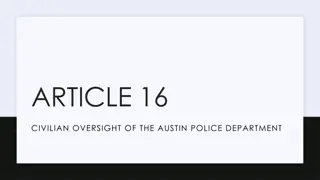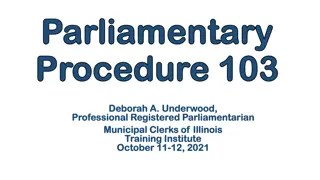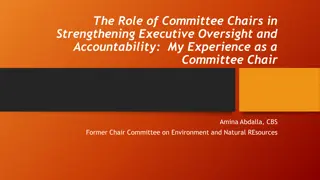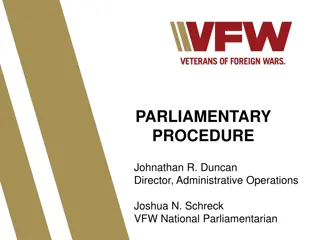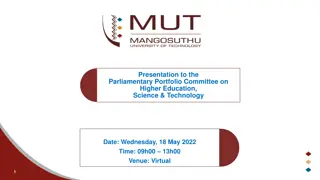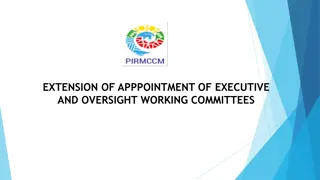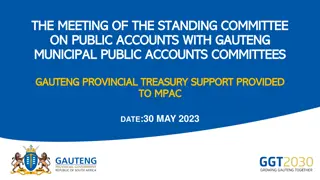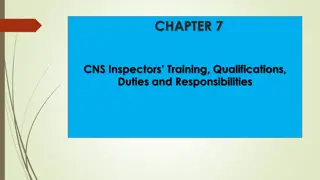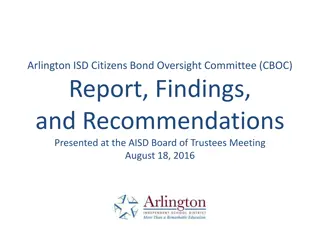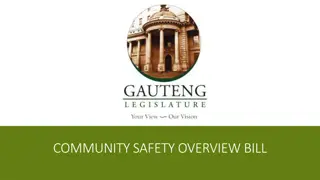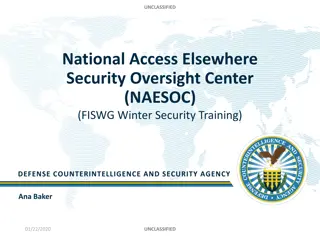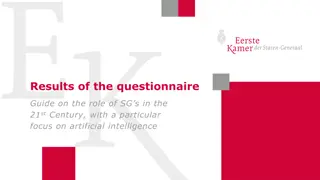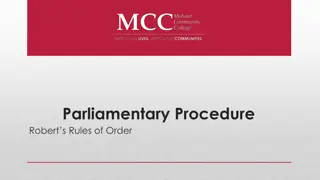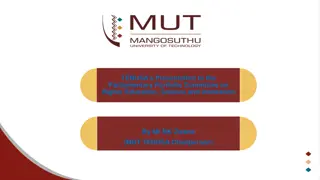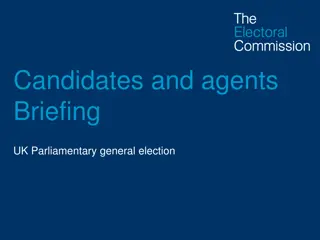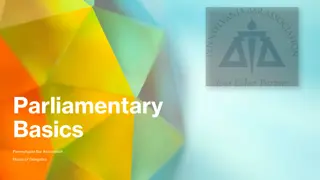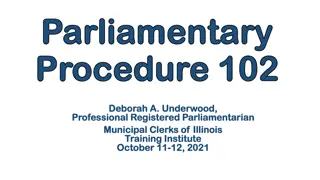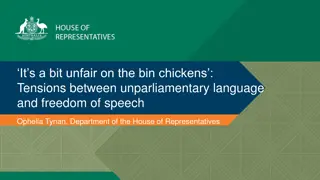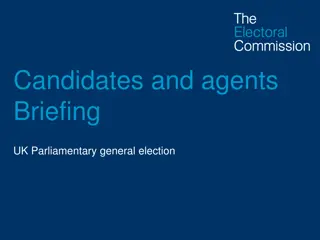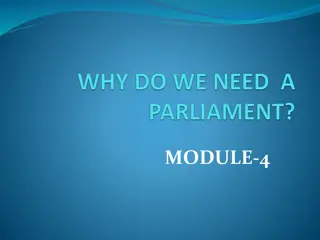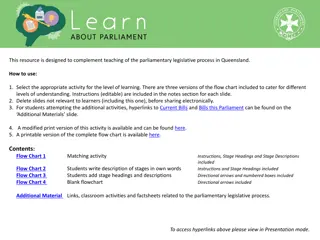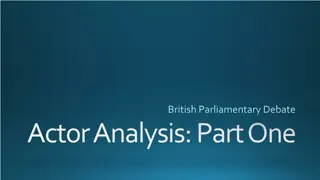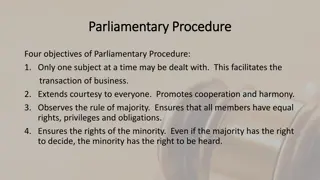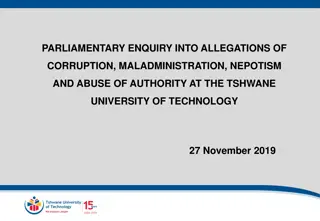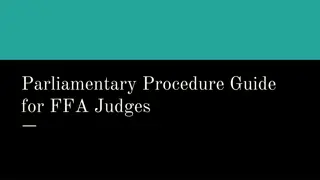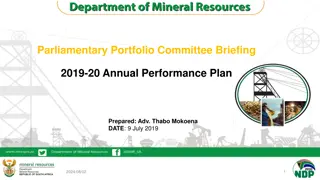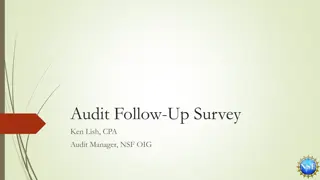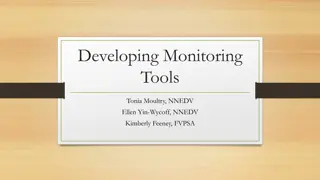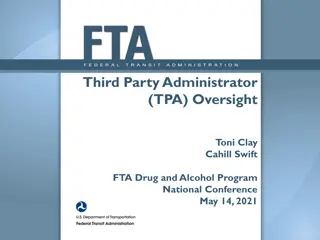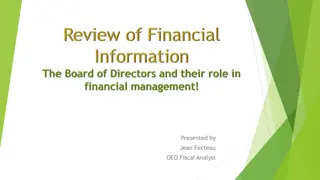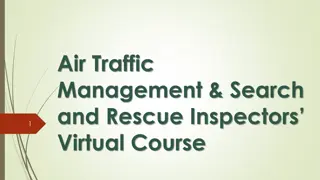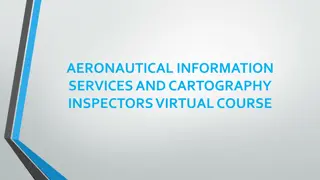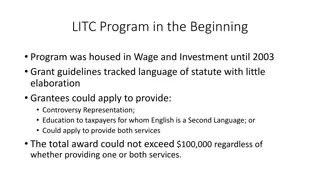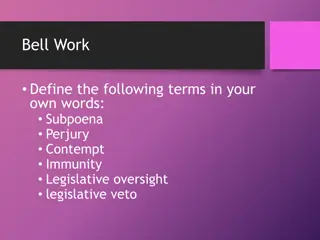Challenges and Significance of Parliamentary Oversight at EU Level
This content delves into the challenges and constitutional significance associated with parliamentary oversight at the EU level, exploring issues such as the legitimacy of executive power, the effectiveness of scrutiny mechanisms, and the complexities of controlling the EU executive. It also discusses classic instruments like motion of censure and power of inquiry in scrutinizing EU activities. Overall, the content highlights the evolving nature of oversight in the EU context.
Download Presentation

Please find below an Image/Link to download the presentation.
The content on the website is provided AS IS for your information and personal use only. It may not be sold, licensed, or shared on other websites without obtaining consent from the author. Download presentation by click this link. If you encounter any issues during the download, it is possible that the publisher has removed the file from their server.
E N D
Presentation Transcript
Parliamentary oversight at EU level: Challenges facing classic scrutiny instruments and emergence of new forms of steering scrutiny Eva-Maria Poptcheva Former policy analyst at EPRS
CONSTITUTIONAL SIGNIFICANCE OF PARLIAMENTARY OVERSIGHT AT EU LEVEL CONSTITUTIONAL SIGNIFICANCE OF PARLIAMENTARY OVERSIGHT AT EU LEVEL Oversight legitimises exercise of executive power if uninterrupted chain of responsibility: decisions are attributable and influenceable EU context: output legitimacy input legitimacy decision- making effectiveness of legislation (separation of powers) politicisation through parliamentarisation (fusion of powers) effective scrutiny? objective (apolitical?) implementation scrutiny
CHALLENGES FACING EU PARLIAMENTARY OVERSIGHT CHALLENGES FACING EU PARLIAMENTARY OVERSIGHT Who to control? Institutional vs. functionalist approach Vertically: Challenges of a multi-level system of interwoven competences diffusion of executive functions in a multilevel system Horizontally: contest to exercise executive power Commission, Council, European Council (CFSP), HR What to control? No uniform executive process; No catalogue of policy areas over which Commission has executive power EU executive action outside EU framework How to control? Challenges of a consensus democracy Predetermination of decision-making at agenda-setting stage; role of the European Council
CLASSIC INSTRUMENTS OF PUNITIVE (EX CLASSIC INSTRUMENTS OF PUNITIVE (EX- -POST) SCRUTINY POST) SCRUTINY Motion of censure, Art. 234 TFEU activities of the Commission : COM can act as an EU body also outside Treaties' framework - institutional approach: political control only over COM, but not only over executive action Consequences of a stronger political link between EP and COM?
CLASSIC INSTRUMENTS OF PUNITIVE (EX CLASSIC INSTRUMENTS OF PUNITIVE (EX- -POST) SCRUTINY POST) SCRUTINY Power of Inquiry, Art. 226 TFEU Contraventions and maladministration also by national authorities, natural and legal persons implementing EU law Addressees compliance with investigative requests and recommendations - Commission - Member States
CLASSIC INSTRUMENTS OF PUNITIVE (EX CLASSIC INSTRUMENTS OF PUNITIVE (EX- -POST) SCRUTINY POST) SCRUTINY Parliamentary control over implementing acts, Art. 291 (2) TFEU Generally, implementation by national authorities Implementing acts by Commission and Council only where necessary for uniform implementation. Who controls Commission s implementing acts? - EP and Council: only ultra vires - Member States: advisory and examination procedures national executive control over EU executive action Who controls the Council? Collaborative decision-making under national parliamentary control?
CLASSIC INSTRUMENTS OF PUNITIVE (EX CLASSIC INSTRUMENTS OF PUNITIVE (EX- -POST) SCRUTINY POST) SCRUTINY Questions for oral and written answer, Art. 230 (2) TFEU Questions for written answer: - to the Commission: individual Members - Treaty right to question Council only re. CFSP, Art. 36 TEU, but Council practice and RoP - No Treaty right to question European Council, but EUCO President agrees to be questioned about own political activities (Rule 130 RoP) Questions for oral answers: to the Council, the Commission or to the VP/HR (Rule 128) Advantages of oral and written questions - ad hoc, no specific previous steps, quick reaction to events - scrutiny tool at disposal of individual MEPs, parliamentary minority - soft sanction character: obtain information, highlight problems
SOLUTIONS TO SCRUTINY CHALLENGES? SOLUTIONS TO SCRUTINY CHALLENGES? Personification of executive powers in the Commission and clear-cut executive competences But interlocking of agenda-setting, legislation and implementation through checks and balances Steering (ex-ante) oversight to compensate for classic instruments shortfalls stronger political link between EP and Commission quality of accountability
STEERING OVERSIGHT STEERING OVERSIGHT Monitoring the implementation of political priorities and legislative programming Commission Work Programme State of the Union debate Joint Declaration on annual inter-institutional programming (2016 BLM agreement) Review of Commission impact assessments and ex-post evaluations Implementation reports Concern transposition and implementation in the Member States Complementary to classic ex-post scrutiny instruments




